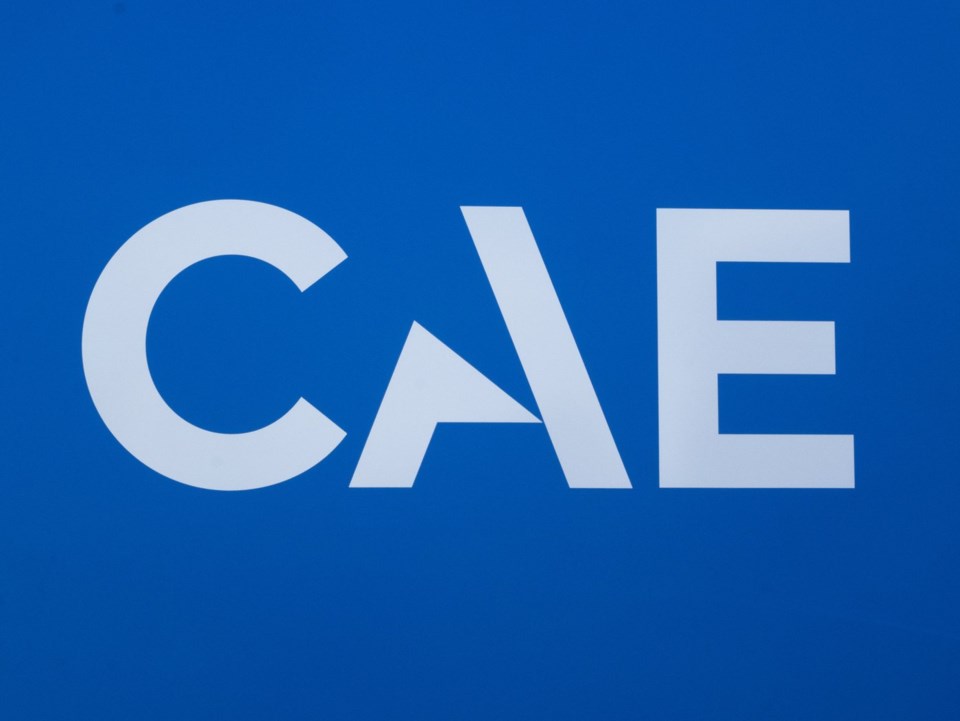MONTREAL — CAE Inc. expects to report a half-billion-dollar loss for its fourth quarter after massive one-time charges linked to its beleaguered defence business.
The flight simulator maker announced a $568-million "goodwill impairment" for the segment on Wednesday. It also reported a $36-million writedown of intangible assets and $90 million in unfavourable contract adjustments tied to fixed-price defence contracts.
"The impairments and the accelerated risk recognition on the legacy contracts are a disappointing but necessary step to account for the programmatic risks we previously identified and provide a clearer path to margin improvement amid compelling secular trends for defence," said CEO Marc Parent in a release.
The financial hit prompted a drop of $1.74 or about six per cent in CAE's share price to $25.32 in early afternoon trading.
It also helped push the company to make further changes to its upper ranks after announcing in April the departure of defence president Daniel Gelston at the end of this month, to be replaced by Jason Goodfriend. On Tuesday evening, CAE said Nick Leontidis has stepped into the new position of chief operating officer overseeing CAE's defence-side and civil aviation business, which he previously headed, to "drive additional synergies" between the two segments.
"Because our defence performance has fallen well short of our expectations, we have taken measures to re-baseline the business, including a leadership reorganization and further targeted operational changes at the segment and corporate executive management levels," Parent said.
The impairment and contract writedowns led CAE to forecast a loss of $504.7 million when it reports its fourth-quarter financial results this coming Monday. The total stands in contrast to analysts' earlier expectations of a $134-million profit and to net income of $98.4 million from a year earlier.
"Although taking a massive impairment and acknowledging a large loss on these contracts is hard to spin as positive, ripping the proverbial Band-Aid off now will avoid CAE having to suffer from ongoing margin erosion from these legacy contracts, some of which are set to run for another two years," said National Bank analyst Cameron Doerksen in a note to investors.
The contract outcome effectively pulls forward losses that CAE expected to incur through 2026, after which the deals will have wound down.
“Where the surprise comes for me is that they’ve basically done it all at once,” Doerksen said in a phone interview.
In February, chief financial officer Sonya Branco said the fixed-price agreements faced "execution difficulties" stemming from inflation, supply chain disruptions and labour issues.
The eight legacy contracts — under which the firm must pay for expense overruns itself — date back to before the COVID-19 pandemic "with little to no provision for cost escalation," she said.
Doerksen described the goodwill impairment as the result of an accounting test on intangible assets. Such assets might range from brand value to a perceived advantage from proprietary technology.
"In this case, CAE built up a sizable amount of goodwill on its balance sheet related to various acquisitions that they made," he said. "And every year you have to basically do a test on what you think the future profitability is of that business.
"If it ends up СŔ¶ĘÓƵ different than what your original estimates were ... then you have to take a goodwill impairment."
Despite legacy woes, CAE's defence business enjoys a "solid and growing backlog and a positive defence spending backdrop," Doerksen added.
More than four of every five dollars earned by the company comes from the civil aviation side. In turn, the majority of that revenue stems from flight training, while another third comes from flight simulator sales, he said.
This report by The Canadian Press was first published May 22, 2024.
Companies in this story: (TSX:CAE)
Christopher Reynolds, The Canadian Press



